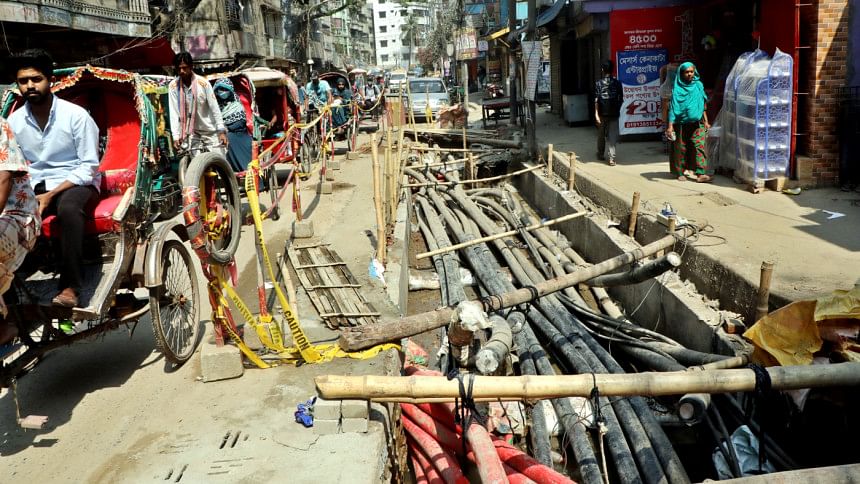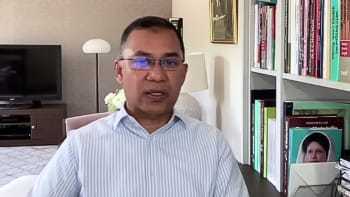Dug up, unfixed roads: a nightmare for residents

There are several parts of Dhaka city where, if you travel through the roads and alleyways by a rickshaw or an auto-rickshaw, you will experience a jerky ride, as many streets remain unrepaired for months after being dug up by utility service providers.
The dug-up roads leave residents struggling with dust clouds and severe congestion. Even a drizzle turns these pathways into mud-slicked hazards, making walking a nightmare.
Unfinished trenches and piles of debris at construction sites contribute to air pollution and pose serious health risks to the residents of the city, which frequently tops global charts for the worst air quality.
The problem persists due to a lack of oversight and accountability, as the guidelines outlined in Dhaka's 2019 Road Excavation Policy are routinely flouted by contractors and utility service providers.
The policy states that only small sections should be excavated at a time, with all work to be completed within 15 days. Trenches must then be compacted with sand and reinforced with bricks to make the road suitable for vehicles. Additionally, contractors must clear debris within 24 hours and cannot bring equipment to sites before the designated start time.

Further provisions require that both the excavated road and its surface drains be thoroughly cleaned after completion, restoring the area to its original condition.
In reality, these guidelines are seldom enforced, leaving city dwellers to suffer.
A glaring example is a kilometre-long stretch of Falpatti Road in West Senpara. Nearly a year ago, trenches were dug at 20-metre intervals to upgrade Wasa's supply line. Once completed, the trenches were left half-filled with debris and unrepaired.
"Often, axles and wheels of loaded rickshaw vans break when they fall into the trenches," said three-wheeler driver Harun Mia.
West Senpara resident Masudur Rahman said many alleys have been in disrepair for years, making rickshaw and auto-rickshaw travel nearly impossible. "A significant part of the road is occupied, causing severe congestion. With no repairs in sight, many have been forced to move elsewhere."
Dhaka Electric Supply Company Ltd (Desco) dug a trench along Begum Rokeya Sarani's western lane from Kazipara to Mirpur-10 months ago for cable installation but left it half-filled.
Loose sand piles near Kazipara Metro Station create dust hazards for locals.
"They left without compacting the sand. Every passing vehicle stirs up dust, harming our health," said Md Yusuf, a shop employee.
Documents show that in November last year, Dhaka North City Corporation (DNCC) approved road-cutting permits for 19 individuals and nine service-providing organisations in 44 areas under its jurisdiction. Dhaka South City Corporation (DSCC) also granted road excavation permissions for around 10 locations in February.
These correspondents visited Mohammadpur, Indira Road, Malibagh to Khilgaon Railgate, Khilgaon Taltala, Khilgaon Tilpapara, Gandaria's Dinanath Sen Road, Satish Sarkar Road, Shankarinagar Lane, Kazipara, and Senpara in Mirpur over the past few weeks and found many roads in a dire state.
Md Masud, a Khilgaon resident, said road excavation by Dhaka Power Distribution Company Ltd (DPDC) from Sipahibagh to Khilgaon Chowrasta has been ongoing for over a month, causing severe congestion and excessive dust.
Mohammad Sihab Khan of Tilpapara now walks 20 minutes to take his daughter to school, which previously took just a five-minute rickshaw ride.
Mohammad Jalal, a fruit trader at Khilgaon Cumilla Hotel Crossing, said, "My income has dropped by three-quarters over the past few weeks due to the road excavation for DPDC line installation."
A similar situation persists at Honda Gali on Indira Road, where DNCC has been digging for stormwater drainage.
Holy Cross School student Ashna Fabiyana said excavation, ongoing since before Ramadan, has forced her to walk or take alternative routes.
Contractors failed to install project signboards or caution tape as required by guidelines, she added.
Kazipara to Monipur Road remains nearly unusable despite recent brick reinforcement after last year's sewerage work.
Shop owners Md Ripon and Mohammad Jalal report heavy losses, with Ripon losing Tk 7 lakh in a year due to inaccessible roads.
Officials from the utility service providers responsible for the excavations said road repairs are the responsibility of the city corporations, as they are required to pay advance funds before obtaining permission to dig.
AKM Shahid Uddin, deputy managing director of Dhaka Water Supply and Sewerage Authority, and Md Monjurul Hoque, executive director (engineering) of Desco, said they inform the city corporations after completing their work, and it then becomes the corporations' duty to repair the roads.
DNCC Chief Engineer Brig Gen Md Moin Uddin said due to the absence of an administrator and a chief executive officer for a period, necessary actions could not be taken.
"We now have both the administrator and CEO and are taking all necessary steps to renovate the roads. All required tenders have been completed, and we aim to repair all dug-up roads by April 14," he told The Daily Star.
When asked why some roads had been left unrepaired for months, he said in cases of large-scale work, roads are sometimes left for testing, which can cause delays.
Asked about violations of road digging guidelines, DSCC Chief Executive Officer Zillur Rahman said they are imposing fines whenever breaches occur during excavation work.


 For all latest news, follow The Daily Star's Google News channel.
For all latest news, follow The Daily Star's Google News channel. 



Comments